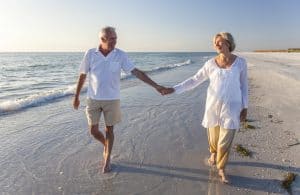Weight loss may help reduce falls and increase balance as we age.
When I was in medical school, evidence-based medicine was not the center of the training of new students and doctors. Today, evidence-based medicine is the center of how medical providers practice medicine. When I trained, I was taught that frail older women were more likely to break a hip as they age. While this might be true is easy to jump to the conclusion that the person’s thinness was the cause of the hip fracture. This jump to a conclusion would be false because the thin women were more likely to live to older and thus have more falls and fractures.
A study from the July issue of the Annals of Physical and Rehabilitative Medicine looked at body mass index and falls[1]. In the research, the researchers studied changes in gait and balance parameters and the fall frequency in obese patients during weight loss. They enrolled 37 patients aged 23 to 69 years with body mass index over 35. All patients received recommendations to adhere low-calorie diet and to add physical exercises in order to reduce their body weight. The researchers evaluated each subject’s body weight, the number of falls for 3 months, 10 meters walk test along with a flat surface and stabilometry in Romberg test at baseline and after 3 months of weight loss program’s start. The results revealed an average body weight decreased from 124.1 to 118.1 in the study group during the three months of the study. The body weight loss was accompanied by a significant reduction of the falls and a significant increase in the speed of walking. Also, the weight loss resulted in improved stability.
The bottom line: The weight loss in obese patients is associated with the decline of fall frequency, improvement of gait speed, static, and balance. The influence of body weight loss on gait and stability suggests that obese patients can reduce their risk for falls and thus fractures with exercise and weight loss. I recommend exercise and walking as adjunctive therapy for weight loss in all of my patients. More research is needed, but this is promising.
References
-
[1]L. Marchenkova, V. Valeria, and M. Eryomushkin, “The influence of body weight loss on gait and stability functioning in obese patients,” A, vol. 61, p. e292, Jul. 2018 [Online]. Available: 10.1016/j.rehab.2018.05.682″ target=”_blank” rel=”noopener noreferrer”>http://dx.doi.org/10.1016/j.rehab.2018.05.682








Be the first to comment on "Research: Weight loss can lead to fewer falls as we age."